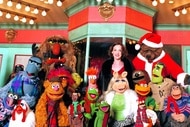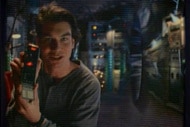Create a free profile to get unlimited access to exclusive videos, sweepstakes, and more!
Science Behind the Fiction: Could people have psychic powers, like in The Shining?

Stephen King has written many, many stories that will make your skin crawl and your bones tremble, but The Shining just might be his scariest, most iconic work. The book tells the tale of the alcoholic writer Jack Torrance as he gradually goes insane while staying at the haunted Overlook hotel over the winter. He puts his family in danger as he breaks down, and only little Danny Torrance's psychic powers, his ability to "Shine," can save him from dad's madness.
Legendary filmmaker Stanley Kubrick adapted the book, and while King infamously was unhappy with the movie, Kubrick's work is a masterpiece in its own right. Now, in the midst of something of a Stephen King renaissance, the sequel to The Shining, Doctor Sleep, is making the jump to the big screen too.
None of us would envy the Torrance family and their many, varied living nightmares, but there’s something intriguing about the shine. That precognitive ability is the sort of ability we’d likely all want to have, provided it didn’t give us a window into horrors. In fact, it’s the sort of ability many people claim to have, maybe even believe they have.
Which causes one to wonder — are precognitive abilities real?
CAN WE TELL THE FUTURE?
No. But also, sort of ... maybe?
There’s an industry built around the notion of psychic abilities, from storefront palm readers to psychic hotlines. Life can be frightening and the future ambiguous. It’s no wonder many people are willing to shell out considerable sums for a chance to know what’s coming.
Employing psychics, however, isn’t only something that happens in strip malls and over late-night phone calls. Throughout human history, governments and world leaders have tapped psychics to give them advance insight into crop yields and the movements of their enemies.
In the sixteenth century, Nostradamus published his book Les Prophéties, containing nearly a thousand predictions of future events. While his predictions are vague and open to considerable interpretation, his book remains in print to this day.
Nostradamus does have his supporters, even in the modern era, but he’s mostly the stuff of tabloids. That’s not to say, however, that belief in psychic ability is a thing of the ancient past.
In the 1970s, the United States government embarked upon a classified project involving psychic spies, with the intent of getting the jump on Russia and winning the Cold War. The project went on for decades, but the results are unclear (especially to us non-psychics). Analysis indicated something more than statistical noise but confirmed tests did not result in “actionable intelligence.”
Uri Geller, who was intimately involved in those CIA studies, made himself famous claiming a whole slew of paranormal abilities, including precognition and the ability to manipulate objects with his mind. Geller was, however, unable to replicate these abilities in a controlled setting.
Despite becoming a celebrity among believers in the paranormal, Geller met his match in James Randi, on The Tonight Show, in 1973. Once placed in a controlled setting, his abilities seemingly disappeared.
This has been the longstanding curse of psychic abilities. Purveyors tend to thrive in situations they can design and control. They lean on vaguery and interpretation to allow the recipient to find whatever meaning they want in their predictions and abilities. But as soon as they’re put up against rigorous design and controlled studies, the ability disappears.
The longstanding conclusion, from scientists and skeptics, has been that these abilities simply don’t exist. Otherwise, they would appear in measured experiments.
Historically, any evidence of precognitive ability has existed in the fringes, adamantly believed by supporters and purveyors but discounted by researchers. Recently, though, some rigorous research has been conducted that supports some level of psychic ability.
Daryl Bem, professor of psychology, got interested in psychic abilities when he was asked to find flaws in the methodology of a colleague’s study and found none. Over the course of nine experiments, with roughly a thousand participants, Bem collected evidence suggesting some precognitive ability in humans.
Bem’s experiment gave participants a list of words and asked them to retype as many of them as they could remember. Afterward, some of those words were randomly selected by a computer and participants were given practice exercises on them.
The studies found that participants were more likely to recall words that would later be randomly selected by the computer. In all but one of Bem’s nine experiments, the hypothesis of precognitive ability was confirmed. According to Bem, the likelihood of that data being the result of random chance is 74 billion to one.
More impressively, his results have been published in the American Psychological Association's Journal of Personality and Social Psychology. Bem’s experiment indicates there may be some precognitive ability in humans, but offers no explanation for how the ability occurs nor whether it can be tapped into intentionally.
Participants didn’t know they were able to more accurately predict words that would later be selected by the computer, which hearkens back to the earlier studies by the CIA. If an individual does have some latent psychic ability, but is unaware and unable to actively access it, it can’t result in any actionable data.
At best, this might help to explain sensations of intuition, but will not result in the ability to see the future, or talk with the spirits haunting an empty hotel. Ultimately, what Bem offered is some compelling data, but we’re lacking a complete theory. The question of precognition deserves further study.
Maybe one day, with more data, we’ll figure out whether we have latent psychic abilities. Maybe not? Only time will tell. If anyone out there is psychic, maybe they can let us know.


























